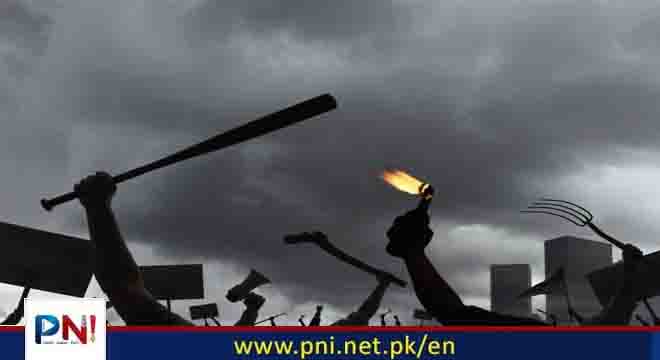PESHAWAR Dec,15 : Since its inception, Pakistan experienced different eras of political and democratic struggles against dictators and political hegemonic leadership besides foreign conspiracies to keep the nation intact and steadfast against all odds.
This journey of struggles and turmoil, political or dictatorial, left indelible imprints on our tumultuous political history with sometimes political forces warring against each other or sometimes unanimously against the dictatorial regimes.
The uncalled for exercise of democratic and dictatorship rules, have not only disrupted the democratic process again and again but also hindered socioeconomic development in Pakistan, resulting increase in unemployment and brain drains of youth.
During all these eras we found some sense of sanity and tolerance in struggles, agitations, protests and even political differences except scattered incidents of violence. But, in recent years an onslaught of immoral assertions, below the belt criticism and bitter mud-slinging surfacing on our political scenario with rival politicians hurling unethical allegations and using slang assertions against each other.
This tendency has not only badly damaged our social fabric but also ruined ethical values of most of youth who are deemed to be future of nation. Most of these slangs were unfortunately introduced to political workers by Pakistan Tehreek-e-Insaaf leadership.
This haughty and arrogant segment of political struggle made to ignite workers passion to intolerant and insulting attitude shrinking room for other’s point of view and promoting ethics of abusing opponents leading society to saturation.
“Politics of violence—characterized by long marches, sit-ins, street protests and hooliganism—pose a significant threat to democratic governance,” remarked Prof. A.H. Hilali, a retired educationist from University of Peshawar. “Democracy derives its strength from people’s vote. In genuine democracies, political rivals outclass opponents with better performance and not with violent protests, agitation rallies and sit-ins.”
He said the developed nations had achieved economic success by ensuring political stability and continuity of policies rather than pursuing disruptive movements or bloody protests.
“Pakistan’s stained political history reflected a pattern of instability, often triggered by dissatisfaction with election outcomes. The country, blessed with abundant natural resources and a large population, has yet to realize its full economic potential due to overthrowing elected governments,” Dr Hilali said.
“Irrational agitation politics, persistent political intolerance and disrespect for electoral mandates derailed democracy again and again,” he stated. “Absence of strong constitutional framework during early years of independence and consequent accusations of election rigging by rival parties had hampered country’s democratic evolution.”
Referring to PNA’s movement of 1970s and consequent cycle of political chaos during 1990s when the successive governments of PPP and PML-N were dismissed on allegations of corruption and electoral manipulation, political uncertainty continued to prevail.
In 2014, a new chapter of political unrest unfolded when Pakistan Tehreek-e-Insaf (PTI) and Pakistan Awami Tehreek (PAT), launched a long sit-in against the PML-N government, accusing them of rigging the 2013 general elections.
Although the allegations of electoral fraud against PMLN government were dismissed by an independent commission led by former Chief Justice Nasirul Mulk, yet both the PTI and PAT unfolded a new trend of abusing, maligning and slandering political opponents.
“The PTI founder did not learn a lesson from country’s past grim political history and encouraged assault on sensitive military installation on May 09 and storming the capital on November 24 by utilizing public resources of KP’s provincial government,” remarked Ikhtiar Wali Khan, PMLN KP Information Secretary. “The PTI leadership once again exploited workers sentiments for fulfillment of its ulterior motives and their violent approach to target state institutions and attempts to undermine democratic process had badly damaged national fabric.”
Wajid Ali Khan, former environment minister also criticized the PTI leadership for telling lies and making false claims and described their demands to revoke 26th constitutional amendment and release of Imran Khan as childish. “Only parliament can undo or pass a constitutional amendment while PTI leader was jailed on corruption charges and only courts could release him.”
He asked the KP Chief Minister to focus on province’s peace and development instead of spoiling time and government resources on agitation politics. “When warring faction were assaulting each other in Kurram, the Chief Minister was busy in futile agitation.”
Wajid Ali said when PTI’s anti-corruption slogans were badly exposed after billion trees project, on what grounds its leadership was protesting to get the founder freed from jail without trial? “BRT is running in loss, KP’s Ehtasab Commission is closed and probe starts in the billion tree project. Does it mean that their agitation is for escaping with all this corruption?”
Experts believe that repeated long marches and agitations had eroded people’s trust in political forces, democratic institutions. Irrational tactics of PTI leadership could not bring genuine change rather created political polarization and shook the confidence of foreign investors.
As our people still have an enduring hope for a strong democratic future and a prosperous Pakistan, political forces must mend their ways to materialize this dream and avoid unnecessary onslaught and slangs against political opponents as well as ruining our noble political norms and ethics.
Follow the PNI Facebook page for the latest news and updates.









